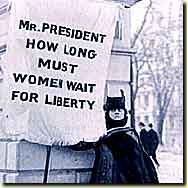Alice Paul, born in 1855 to Quaker parents, is amongst one of the few Americans that has had a major impact on the history of this country. She had an unyielding vision that guided her and fellow suffragists to fight towards equality for women. Paul was progressive and unstoppable.
Alice Paul was born in New Jersey
After finishing her master’s degree Paul made a decision to become a suffragist. She joined the National American Women’s Suffrage Association (NAWSA) and quickly found herself working in Washington D.C.
After continued dissatisfaction with the efforts and campaign techniques of NAWSA, Paul left and formed the National Women’s Party (NWP). NAWSA supported President Wilson and saw the Democrats as allies. Paul wanted to hold Wilson and the democrats responsible for women’s continued disenfranchisement.
Under Paul’s leadership, the NWP organized “Silent Sentinels” in which the suffragist would stand outside the White House holding banners that were inscribed with provocative phrases directed towards President Wilson. President Wilson was amused by the suffragist and gave them little attention, each day, as he passed them.
The turning point came when the U.S.
In direct response to the public’s protest about the prison abuse, President Wilson reversed his position and announced his support for a suffrage amendment. He called this decision a “war measure.” Due to Alice Paul’s continued commitment to a cause, in 1920 the 19th Amendment was passed. This gave women the right to vote after a long 72 year battle.
Alice Paul was an amazing, progressive leader of her time. Her courage and determination are unmatchable by many. She had a vision and never let the many obstacles she encountered, lead her astray. She was fearless in her labors. She did not allow time or society to define her. It is remarkable, that in spite of her efforts, sacrifices and accomplishments she is still not a recognizable historic figure. Alice Paul was an unassuming leader who focused on a cause and not recognition for her efforts.
Carol, R., Myers, K. and Lindman, J. (2007) Alice Paul: Feminist, Suffragist and Political
Strategist. Alice Paul Institute. Retrieved from http://www.alicepaul.org/alicepaul.htm

Operating in the political realm, as well, Robert Kennedy--like Alice Paul--was passionate and stalwart in his convictions. Not unlike Paul, RFK's liberal, progressive political opinions were contrary to conventional wisdom in the wartime South and middle America (e.g. against the war in Vietnam, for civil rights enforcement, etc.); nonetheless, Kennedy held firm to his beliefs, even at the risk of unpopularity that could have been a detriment in his presidential aspirations. Both Paul and Kennedy were fearless in their work to ensure equality, and both remained unflinching in the face of adversity.
ReplyDeleteMartin Luther and Alice Paul have a few things in common! Both were tireless workers for their cause and both suffered greatly when they continued their work in spite of great public outcry. Unstoppable is a good term to describe Martin Luther, as well, because he would not retract what he wrote against the Catholic church. The courage shown by Alice Paul and Martin Luther is truly inspiring. They were both extremely committed to their cause and followed their hearts.
ReplyDelete